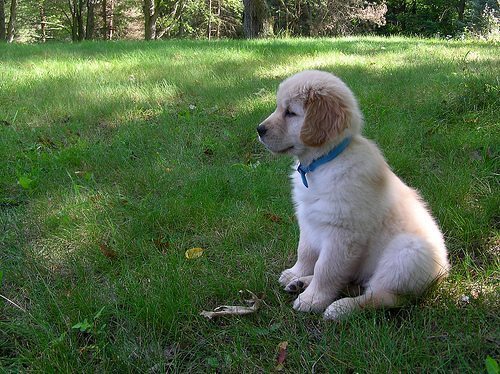For some reason, house training a puppy, or even an older dog, seems to be problematic for many people. Maybe it’s that they  aren’t prepared for the commitment of house training. Maybe they don’t realize that dogs need to be taught what is expected of them. Whatever the reason, house training a dog really should not be too difficult. It does require time, consistency, and lots and lots of patience. But, knowing beforehand the plan to use in house training your dog, and making the commitment to follow through with your plan, makes the process fairly simple.
aren’t prepared for the commitment of house training. Maybe they don’t realize that dogs need to be taught what is expected of them. Whatever the reason, house training a dog really should not be too difficult. It does require time, consistency, and lots and lots of patience. But, knowing beforehand the plan to use in house training your dog, and making the commitment to follow through with your plan, makes the process fairly simple.
The most important thing to remember when house training a puppy is that you are working with a baby. Just like a human baby, they do best with a regular schedule. With a schedule, they learn when it’s time to eat, when it’s time to play, and when it’s time to “go potty.” How often should your puppy go outside? A rule of thumb is that a puppy should be able to “hold it” for one hour for every month of age. So, you can expect a two month old puppy should be able to control her bladder for two hours. You’ll want to take her out at least every two hours–maybe more often when you first bring her home. You’ll also want to take her out as soon as she wakes up, before and after eating or drinking, and during and after play. Yup, it’s a time commitment! If you are going to be away for a long period of time, it’s essential to have someone–a neighbor or pet sitter, if you can’t get home–stop by to take the puppy outside. Consistency is key.
Pick a spot in your yard for your dog’s toilet area and decide on a word or phrase you want to use so he’ll learn what to do. We use “go potty.” Always take the dog out on a leash directly to his toilet area. As soon as he starts to eliminate, say your word or phrase (“go potty”). A word of caution, here. Don’t say it too loudly, or you may scare the poor puppy and they’ll stop. Luckily my puppy really had to go the first time this happened, so she continued almost immediately. I learned to be a little more reserved from the experience.
When the puppy is finished, praise, praise, and praise. I don’t think you can praise too much! You could also offer a treat. No matter what you do, it must be positive, it must be given as soon as the dog is finished and it must be done every time. The idea is to associate “going potty” with something good.
One thing to be aware of is that all dogs–no matter their age–will have an occasional “accident” in the house. It is important to not make a big fuss about it. Clean it up, taking note about what might have caused the problem. Were you gone too long, leaving your dog with no choice? Has your dog been ill? Is there something new and different in the house, or in your lifestyle? If it is a sudden problem with a previously housetrained dog, a visit to the vet may be in order to make sure there isn’t a medical reason for the behavior. A urinary tract infection could be the culprit.
In any case, punishing the dog will not have the effect you might be hoping for. It will only confuse him. Dogs live in the moment, and he will have no idea why he’s being punished. He will only know that you are unhappy with him for some reason. He’ll never understand that his elimination inside is the problem. So, avoid yelling and screaming, and, by all means do not rub his nose in it! Clean up the mess, take him outside, and when he does his business where he should, praise him as if it’s the greatest thing he’s ever accomplished!
Photo: Courtesy of normanack via Flickr (CC by 2.0)









